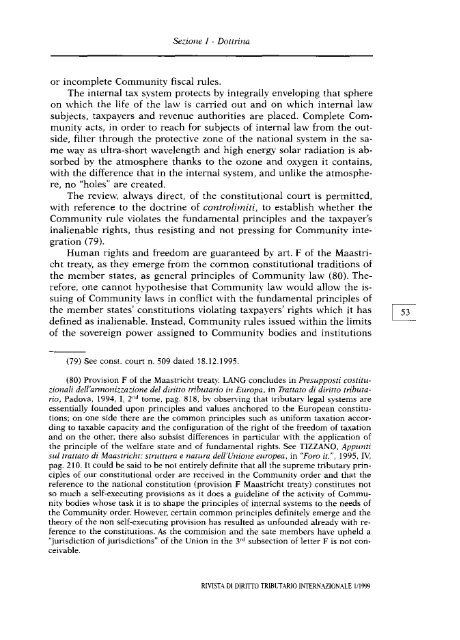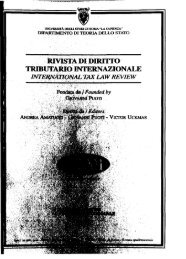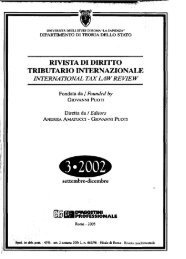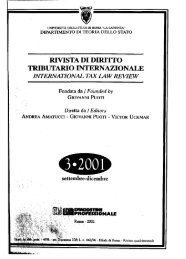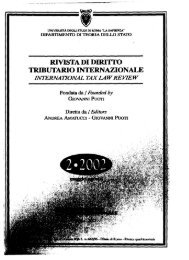rivista di diritto tributario internazionale international tax law review
rivista di diritto tributario internazionale international tax law review
rivista di diritto tributario internazionale international tax law review
Create successful ePaper yourself
Turn your PDF publications into a flip-book with our unique Google optimized e-Paper software.
Sezione I - Dottrina<br />
or incomplete Community fiscal rules.<br />
The internaI <strong>tax</strong> svstem protects by integraIly enveloping that sphere<br />
on which the !ife of the <strong>law</strong> is carried out and on which internaI <strong>law</strong><br />
subjects, <strong>tax</strong>payers and revenue authorities are placed. Complete Community<br />
acts, in order to reach for subjects of internaI <strong>law</strong> from the outside,<br />
filter through the protecti"e zone of the national sl'stem in the same<br />
wal' as ultra-short wavelength and high energy solar ra<strong>di</strong>ation is absorbed<br />
by the atmosphere thanks to the ozone and oxygen it contains,<br />
with the <strong>di</strong>fference that in the internaI system, and un!ike the atmosphere,<br />
no "holes" are created.<br />
The <strong>review</strong>, always <strong>di</strong>rect, of the constitutional court is permitted,<br />
with reference to the doctrine of controlimiti, to establish whether the<br />
Community rule violates the fundamental principles and the <strong>tax</strong>payer's<br />
inalienable rights, thus resisting and not pressing far Community integration<br />
(79).<br />
Human rights and freedom are guaranteed by art. F of the Maastricht<br />
!reaty, as they emerge from the common constitutional tra<strong>di</strong>tions of<br />
the member states, as generaI principles of Community <strong>law</strong> (80). Therefore,<br />
one cannot hypothesise that Community lav . .' would allo\v the issuing<br />
of Community <strong>law</strong>s in conflict with the fundamental principles of<br />
the member states' constitutions violating <strong>tax</strong>payers' rights which it has<br />
defined as inalienable. Instead, Communitl' rules issued within the limits<br />
of the sovereign power assigned to Community bo<strong>di</strong>es and institutions<br />
(79) See const. court n. 509 dated 18.12.1995.<br />
(80) Provision F of the Maastricht treaty. LANG concludes in Presupposti costituzionali<br />
dell'amwl1izza::.ione del <strong>di</strong>ritto <strong>tributario</strong> in Europa, in Trattato <strong>di</strong> <strong>di</strong>ritto <strong>tributario</strong>,<br />
Padova, 1994, I, 2 nd tome, pago 818, by observing that tributary legaI systems are<br />
essentially founded upon principles and values anchored to the European consti tutions;<br />
on one side there are the common principles such as uniform <strong>tax</strong>ation accor<strong>di</strong>ng<br />
lO <strong>tax</strong>abIe capacity· and the configuration of the right of the freedom of <strong>tax</strong>ation<br />
and on the other, there also subsist <strong>di</strong>fferences in particular v.ith the application of<br />
the principie of the welfare state and of fundamental rights. See TIZZANO. Appunti<br />
sul trattato <strong>di</strong> Maastricht: struttura e natura dell'Unione europea, in "Foro it.", 1995. IV,<br />
pago 210. lt could be said to be not entirely definite that alI the supreme tributaI)' principles<br />
of our constitutionai order are received in the Community order and that the<br />
reference to the national constitution (provision F Maastricht treaty) constitutes not<br />
so much a self-executing provisions as it does a guideline of the activity of Community<br />
bo<strong>di</strong>es whose task it is to shape the principies of internaI systems to the needs of<br />
the Community order. HO\vever. certain common principles definiteIy emerge and the<br />
theor)' of the non self-executing provision has resulted as unfounded aIready \vith reference<br />
to the constitutions. As the commision and the sate members have upheId a<br />
"juris<strong>di</strong>ction of juris<strong>di</strong>ctions" of the Union in the yd subsection of Ietter F is not conceivabie.<br />
RIVISTA DI DlRITIO TRlBLTARlO INTERN.\ZIONALE lJl999


